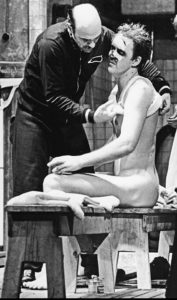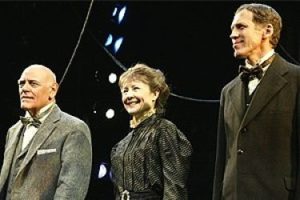John Braden, a veteran journeyman actor whose career led him to roles in major regional theatres and on Broadway—including a part in the Tony-winning ensemble drama The Changing Room in 1973—died in his home in Irvington, N.Y., on Aug. 25, after a long illness. He was 89 years old.
In his 60-year acting career, Braden appeared in character, ensemble, and leading roles, and was a favorite of such resident theatre artistic directors as Arthur Lithgow and Arvin Brown. Like thousands of other actors, his gifts did not take him to stardom but to a life and career in the theatre, with which he also sustained a family and appeared in fulfilling productions on regional and New York City stages. Among his artistic homes over the years were Antioch Shakespeare Festival (run by artistic director Lithgow), McCarter Theatre Company (again, under Lithgow), National Playwrights Conference of the O’Neill Theater Center (the inaugural season and beyond), Lincoln Center Theater, Williamstown Theatre Festival, and Long Wharf Theatre.
He made his Broadway debut in the replacement cast of Mary, Mary. Two of his later Broadway appearances were filmed for public television: Westport Country Playhouse’s production of Our Town in 2002 starring Paul Newman, in which he played Prof. Willard, and Long Wharf Theatre’s Ah, Wilderness!, in which he played Uncle Sid opposite Teresa Wright and Geraldine Fitzgerald in 1975. Braden made many side trips to commercials, films, voiceover gigs, and television guest spots. His daughter, New York City-based actress Gayton Scott—who followed him into the profession to work in resident, Broadway, and Off-Broadway theatre—said he was most happy when working in live theatre.
Braden appeared as rugby trainer Sandy Sandford, who tended the wounds of a young athlete played by John Lithgow, in Long Wharf’s 1972 American premiere of David Storey’s The Changing Room, and later moved to Broadway with the production. Braden had known the Lithgow family since the 1950s, when Arthur Lithgow cast him in classical roles at Antioch Shakespeare Festival at Antioch College in Ohio, on a summer break from Carnegie Tech. (Braden considered Antioch his professional debut, his family said.) Braden earned a BFA in acting from Carnegie in 1954. Arthur’s son John would later direct Braden in the American premiere of Edna O’Brien’s A Pagan Place for Long Wharf Theatre.

John Braden was born John Bracchitta Jr. at his parents’ apartment in Sleepy Hollow, N.Y. His father, John Sr., a Sicilian immigrant, was a landscaper by trade, and his New York-born mother, the former Antoinette DeRiso, was a homemaker. John Sr. wanted his son to one day take over the family landscape business, but an English teacher who was also the drama adviser at Washington Irving High School cast young John in the title role of Charley’s Aunt. He fell in love with the stage right there, his family said. He later quit an agricultural school his father had aimed him toward. The summer after high school he was an apprentice actor Ridgefield Playhouse in Connecticut. That summer, he wrote his mother about his passion for the theatre, and his hope to make his parents proud.
While at Carnegie Tech, Braden earned a Fulbright Scholarship to England’s Royal Academy of Dramatic Art. Theatre legends Cheryl Crawford and Sanford Meisner were on the Fulbright adjudicating committee, he told his family. Crawford was so impressed with Braden’s work that she questioned his wish to go to London. She told him his talent could lead him to work on Broadway right away. Braden told her he wanted to continue learning and deepening his expertise in the classics. While at RADA, he appeared in the first staged presentation of Under Milk Wood with Peter O’Toole. Braden would also later study at the London Academy of Music and Dramatic Art.
Following that postgraduate work abroad, he was drafted into the U.S. Army in peacetime, and was stationed in Honolulu. A superior officer looked at his educational and theatre résumé and asked why Braden wasn’t on a trajectory for officer training (he was a mere private first class). He didn’t have an answer. The officer gave him passes off the base and pointed him to Honolulu Community Theatre (now Diamond Head Theatre), where he played Stanley in A Streetcar Named Desire. Army brass attended opening night, and Pfc. John Bracchitta got rave reviews.
It was during that Honolulu production that Braden met his future wife, Maureen Scott, who was volunteering at the theatre. The British-born Scott moved to New York City with Braden. They married in 1958. Scott made a career for herself as a talent and casting agent in theatre, film, TV and the advertising industry.
In New York City, Braden’s agent told him he had to change his name to something people could more easily pronounce. “Bracchitta” wouldn’t do. His agent opened a phone book, and the actor said, “Well, I’d at least like to keep the B!” So John Bracchitta became John Braden.
In 1967, Braden played Father in Luigi Pirandello’s Six Characters in Search of an Author at Williamstown Theatre Festival. Thirty years later he appeared there under James Naughton’s direction in a rare revival of Charles MacArthur’s Johnny on a Spot in 1997. Also at Williamstown, Joanne Woodward directed him in The Big Knife. His Broadway season with Lincoln Center Theater in 1968 included Tiger at the Gates, Cyrano De Bergerac, Saint Joan directed by John Hirsch, and The Little Foxes directed by Mike Nichols.

Under the leadership of artistic director Arvin Brown, Braden appeared in more than a dozen productions at Long Wharf Theatre in New Haven, Conn., including the American premiere of Peter Nichols’s The National Health, which moved to Broadway’s Circle in the Square. Among his Long Wharf credits were The Contractor by David Storey, The Crucible with Ann Dowd, Chekhov’s The Wedding, Kaufman and Hart’s You Can’t Take It With You, Troika directed by Morris Carnovsky, Hamlet starring Hamish Linklater, Trelawny of the Wells directed by Max Strafford-Clark, and Mornings at Seven opposite Mary Louise Wilson.
Other New York City credits include working in a Shaw Festival at the Provincetown Playhouse; The Purification, a one-act by Tennessee Williams at Theatre De Lys; the Off-Broadway premiere of A.R. Gurney’s The Wayside Motor Inn for Manhattan Theatre Club; The Power and the Glory starring Fritz Weaver at Phoenix Theater; Living Quarters at The Vineyard; and The Balcony at Circle in the Square, directed by Jose Quintero.
Braden was featured opposite Maureen Stapleton in John Ford Noonan’s The Club Champion’s Widow, directed by Robert Lewis for the first season of the short-lived Robert Lewis Acting Company in New Rochelle, N.Y. Braden walked away with the reviews. The New York Times wrote that his character, a suitor to Stapleton’s title character, “consistently commands our attention, and much of that must be credited to Mr. Braden. Balding and seemingly overage for the role of Casanova, he is a dashing and romantic senior citizen. As this waggish conniver, Mr. Braden is such a charmer that one wished Mr. Noonan had written a play about him.”
His many film and TV credits include Cagney and Lacey, Night Court, Golden Girls, The Adams Chronicles, Woody Allen’s Bananas, The Anderson Tapes directed by Sidney Lumet, and many more.
In addition to Maureen Scott, his wife of 62 years, and daughter Gayton, Braden is survived by son Ian Bracchitta (Lydia Bracchitta), a musician who teaches bass at the South Carolina Governor’s School for the Arts and Humanities serves as assistant principal in the Greenville Symphony, and grandchildren Zachary Bracchitta and Emily Bracchitta.


